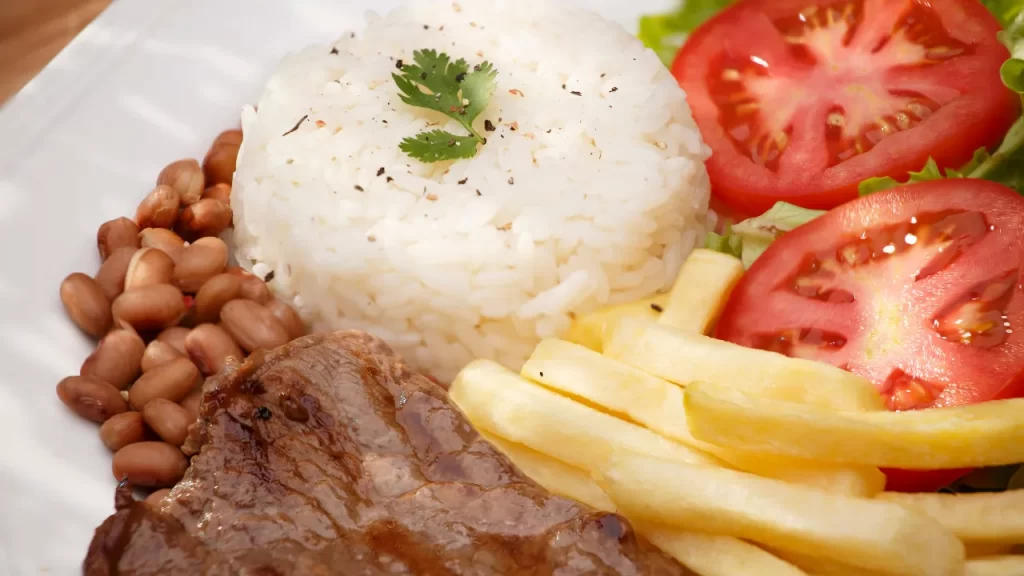Join the Speaking Brazilian YouTube Club to have access to the transcript of this video and many other videos.
Have you ever seen a Brazilian doing something weird?
In this lesson, I’m going to talk about some Brazilian habits and concepts that are considered a bit strange for someone from another country.
1 – Informality
Brazilians are very informal in almost all situations. Even in situations that are considered formal, such as in the work environment, ost Brazilians still use very informal language.

See some examples:
A Brazilian goes to the bakery for coffee and talks to the waiter like this:
– E aí, meu amigo! Vê um pão na chapa! (- What ‘s up, my friend! I’ll have a grilled bread.)
In Rio de Janeiro, it is very common to greet strangers somewhat like this:
– E aí, mermão! Beleza? (- Hey, bro! What’s up?)
2 – Hugging and kissing often
Brazilians hug and kiss everyone! It doesn’t matter if it’s a close friend or a person you’ve just met.
I’m talking about kissing on the cheek, not on the mouth, of course! Hugging or kissing is our usual way of greeting a person.


3 – Put used toilet paper in the trash can

Brazilians put used toilet paper in the trash can, never in the toilet!
The reason we don’t flush the paper down the toilet is the risk of clogging the sewer system or even the lack of structure in some places. But even in places with a lot of structure, you will see signs in the bathrooms saying:
NÃO JOGUE PAPEL HIGIÊNICO NO VASO SANITÁRIO.
(DO NOT THROW TOILET PAPER IN THE TOILET.)
4 – Lunch is the most important meal of the day
In Brazil, lunch is an important meal and needs to be a hot dish, not a sandwich. The most traditional dish consumed at lunchtime is rice, beans, some kind of protein, and salad.
Of course, there are exceptions, but in general, Brazilians take at least one hour for a lunch break and usually go out with friends or co-workers to eat at a restaurant or bring a lunch box with hot food from home.

5 – Brushing your teeth in public
Not all Brazilians do this, but it is very common in Brazil to take your toothbrush to work to brush your teeth after lunch in the company bathroom, usually in front of other people. It’s normal.

6 – Punctuality (or lack of punctuality)
In Brazil, unfortunately, people are not punctual at all. Obviously, in professional situations, lack of punctuality is not welcomed, but it is still very common. It’s so common that delays of up to 15 minutes aren’t even considered delays by many people. It’s just considered normal.

7 – Not having a set end time
In Brazil, usually, things have a set time to start, but they don’t have a set time to finish.
For example, if you invite friends over for dinner or a party at your house, people arrive late and usually stay for a long time.

8 – Clap our hands when we sing “Happy Birthday”
In the United States, people sing “Happy Birthday” without clapping and in a low voice. In Brazil, we sing loudly and clap our hands. It really is a party!
So, don’t be alarmed if Brazilians start clapping and singing loudly in a restaurant or at a birthday party. It’s normal!

9. Pay for small purchases in installments
In Brazil, you can pay everything in installments. Almost everything you buy, you have the option to pay in installments, even very cheap things. It’s a cultural thing in Brazil.
For example, you want to buy a t-shirt with a credit card, and the cashier will ask you how many installments you want to pay.

10 – Public is synonymous with free
As in many places in the world, the word public indicates something that is open to the public. However, in Brazil, this word has a slightly different meaning.
In Brazil, a public institution is an establishment maintained and managed by the State and that offers free services to the public. For example, a public universities are free in Brazil, while here in the United States, they are paid.

That’s it, everybody!
Até a próxima!
Your teacher,
Virginia


